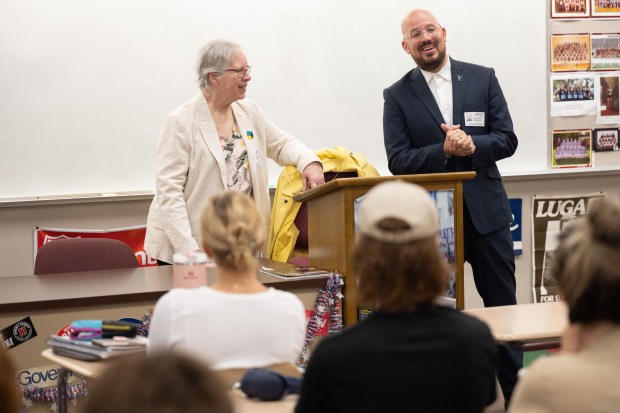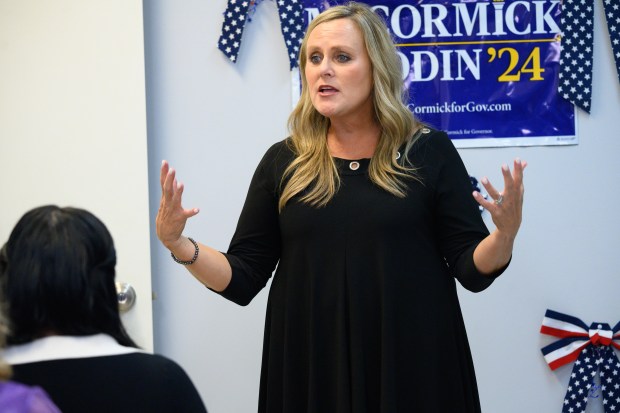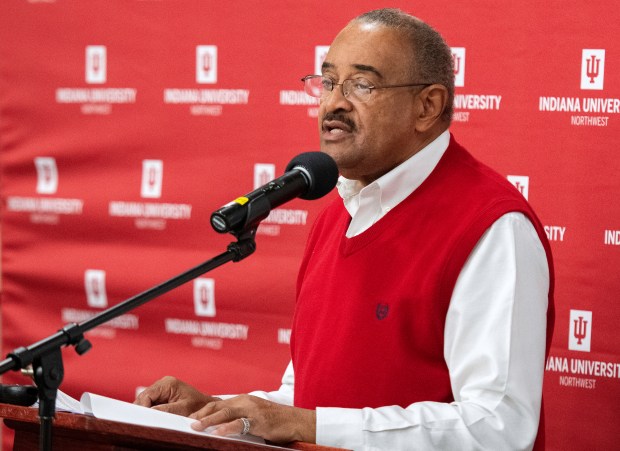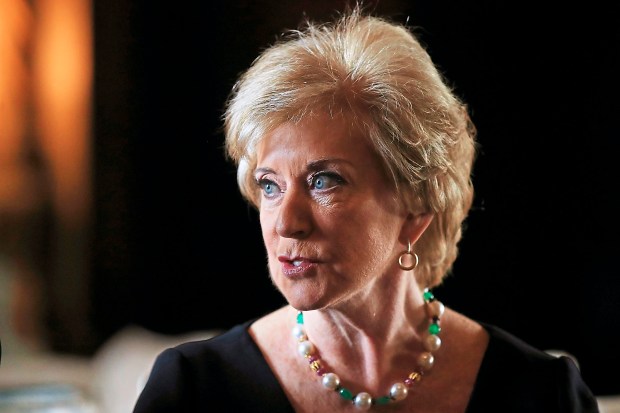President-elect Donald Trump campaigned on his plan to eliminate the U.S. Department of Education, which has left professors and education experts envisioning a mostly bleak future for student learning.
On Tuesday, he announced he chose Linda McMahon, a former chief executive of World Wrestling Entertainment, who served as the leader of the Small Business Administration in Trump’s previous administration.
After leaving his previous administration, McMahon remained in Trump’s circle, serving as chair of a super PAC that backed his reelection campaign in 2020 and serving as co-chair of his current transition team.
McMahon ran twice, in 2010 and 2012, for a U.S. Senate seat in Connecticut but lost both times. After that, McMahon decided to provide financial support to candidates, and gave $6 million to Trump’s 2016 campaign.
Critics say McMahon has little experience to guide federal education policy and budgets.
McMahon served on the Connecticut Board of Education for a year starting in 2009. She claimed that she had a degree in education in a vetting questionaire for the position, but later admitted to the Hartford Courant that contacted the governor about the mistake.
She also spent years on the board of trustees for Sacred Heart University in Connecticut. She has expressed support for charter schools and school choice that have wide GOP support.
State Senator Rodney Pol (right), D-Chesterton, and Representative Patricia Boy, D-Michigan City. answer questions from students during a visit to Chesterton High School on Friday, May 19, 2023. (Kyle Telechan for the Post-Tribune)
McMahon was also named in lawsuit filed in October, which accuses her and other WWE employees of knowing about child sexual abuse by former ringside announcer Melvin Phillips but failing to do anything about it, according to The Associated Press. Phillips, who died in 2012, was accused of assaulting “ring boys” as young as 13.
State Senator Rodney Pol, D-Chesterton, said he was surprised at McMahon’s nomination, but it seemed to follow the direction of other cabinet nominees.
“It’s as if he’s picking the cast of ‘The Apprentice’,” Pol said. “These are people’s lives you are playing with. This is insane.”
Chesterton High history teacher Robert DeRuntz said he doesn’t understand how eliminating the Department of Education would improve K-12 education if it takes money away from public schools.
“Good government is about good policy and good problem solving,” said DeRuntz.

Chesterton High School history teacher Bob DeRuntz, in Union garb, performs the Gettysburg Address for students during a living history Civil War camp in the school’s courtyard on Monday, September 27, 2021. (Kyle Telechan for the Post-Tribune)
The DOE manages the $18.4 billion Title I program that provides more funding support in high-poverty urban areas like Gary, Hammond, and East Chicago.
Financially-strapped Lake Station used its Title I funding to rehire its entire paraprofessional staff after it lost a property tax referendum last year.
The DOE also manages the $15.5 billion program that supports programs for students with disabilities and it oversees the $1.6 trillion federal student loan program.
Brendan Cantwell, a professor of higher education at Michigan State University, said McMahon has little relevant experience with education policy. In appointing McMahon, who has been a friend and ally to Trump, the president-elect stated he wanted to devolve education policy to the states but did not state he would eliminate the department, Cantwell said.

The U.S. Department of Education was established in the 1970s and opened in 1980 to manage the growing portfolio of educational programs and enforce educational laws that Congress passes, Cantwell said.
The department enforces provisions like Title IX, which ensures that gender is not a barrier in full participation — from academics to sports — in higher education, Cantwell said.
For many years, most Republicans in Congress have been skeptical about expanding the federal government, Cantwell said. As a relatively new department, Republicans have viewed the Department of Education “suspiciously,” Cantwell said, and that many portions of the department could be combined with other departments.

For example, most Republican legislators believe federal financial aid could be handled by the U.S. Department of Treasury, Cantwell said. Or, they believe the U.S. Department of Justice could enforce provisions like Title IX, he said.
“Republicans have sort of long viewed getting rid of the Department of Education as a potential goal for downsizing the government,” Cantwell said.
“The difference now is that Trump has championed eliminating the department much more consistently and vigorously than any presidential candidate in the past.”
The timing will also likely prove important, Cantwell said. Trump has discussed eliminating the Department of Education at a time when Republicans maintain their skepticism in the size of government, particularly with administering programs, and when education, particularly higher education, has become culturally and politically polarizing, he said.
“This moment might be the moment when there’s enough energy to get behind a dramatic change to federal education policy,” Cantwell said. “While it’s a proposal that is definitely on the table and will probably get discussed, it doesn’t necessarily mean that it’s guaranteed to happen.”
Congress would have to vote to eliminate the department, Cantwell said. While Republicans will control the next Congress, Cantwell said he foresees disagreement among Republicans on whether or not to prioritize eliminating the department.
Congressional Democrats would oppose eliminating the department, Cantwell said, so it would require the Republicans to unify behind the issue. With two years until the next Congressional elections, it’s not clear if eliminating the department would be a top priority for Republicans.
Education officials have shared a theory that Trump could eliminate the department through executive order, Cantwell said, but it’s not clear if the courts would allow it. It’s likely that if Trump did attempt to eliminate the department through executive order, lawsuits would be filed and the process would be tied up in the courts, he said.
“Those are the obstacles. Congress may not be willing to do it, and if he tried to do it on his own, it might be blocked,” Cantwell said.
But, if Trump were able to eliminate the department, Cantwell said while education laws would likely remain on the books, the enforcement agency wouldn’t be there to make sure the laws are being followed. From there, the federal government would become reactive instead of proactive when it comes to education law, he said.
Without an education department, the federal government would likely lose or greatly reduce the number of experts in education, for example civil rights laws within the context of education, Cantwell said.
Without a Department of Education, schools and universities would have the authority to do what they want, which would follow Republicans’ push for local control in education, Cantwell said.
“President Trump operates much differently than other presidents in the past — both Republicans and Democrats — and so it’s hard to understand exactly what he’s thinking and what would happen,” Cantwell said.
Jennifer McCormick, Indiana’s last elected Superintendent of Public Instruction, said it would be “a huge lift” to eliminate the department. Her immediate concerns have been the execution, from how the department will be eliminated and at what pace, to the purpose, she said.
McCormick, who lost to GOP Gov.-elect Mike Braun earlier this month, questioned whether the purpose of eliminating the department would be to allocate education dollars differently or through a different federal agency or to drastically reduce or eliminate funding.
In Indiana, the majority of federal funds from the Department of Education go to public schools, McCormick said. Funding goes toward supporting students with special needs, students who are eligible for free or reduced lunch, among other things.
When she was state superintendent, McCormick said Indiana received $1 billion annually from the U.S. Department of Education. If that funding ends or were cut in half, the state’s education entities would feel that, she said.
“From the people I’ve talked to, school officials, they’re just very concerned about really why and what happens to the funding because, let’s be realistic, Indiana does not have enough money to replace those funds. It would be really difficult to do that really for any state from the state level,” McCormick said.
McCormick questioned whether the plan would be to allocate federal education funds toward voucher schools, which she said would be “very concerning.”
“The concern is it’s coming across as the reason for it is punitive, and I’m not sure that’s a great reason to eliminate an agency. If you’re looking for efficiency and effectiveness, and if you’re looking for better service to kids, and they deem that to be the best way, but I’m not hearing that,” McCormick said. “It seems to be just ‘we don’t need it’ without much other explanation.”
If the Trump administration was successful in eliminating the department, students would feel that impact because the services and resources teachers that federal funding support would be negatively affected, McCormick said.
“We are already struggling to keep up with the cost of serving kids, and they deserve it. They are eligible and the law protects them. But the funds, we’re really struggling to keep up with the demands of those services,” McCormick said.
Pol said his biggest concern with eliminating the department has been the impact that would have on special needs and low income students. If federal dollars were to become used for charter or voucher schools, public education would suffer, Pol said.
“To me, that’s going to be very problematic,” Pol said. “That should be incredibly alarming.”
State Rep. Vernon Smith, D-Gary, said if Trump eliminates the department, then education standards and procedures will be left largely to the states. Under that scenario, Smith said he has grave concerns that some states may decide they don’t want to teach minorities, special needs individuals, or girls and women.
“There would be no national standards, and so the quality of education across these United States would be diminished,” Smith said. “We would have no regulatory watchdog to see what is going on with our various schools.”
Smith, who serves on the Indiana House Education Committee, said he’d be concerned with the Indiana legislature dictating education policy without federal oversight because of the Republican Party supermajority.
“With a conservative party being in place, they may just do away totally with traditional public education because the movement has been towards charters, has been toward vouchers, funding of private schools and so forth. There’s no telling what would happen with traditional public school,” Smith said.
Smith, who has been a public school educator for more than 30 years, said the ultimate goal of eliminating the department is to have undereducated constituents.
“Educated people are easy to lead but difficult to drive,” Smith said. “I am sure that Donald Trump wants to drive people rather than educate them. When you have an uninformed populace, then the lies that he tells are accepted because they don’t know any better.”
Freelance reporter Carole Carlson contributed to this story.
The Associated Press contributed.
akukulka@post-trib.com




